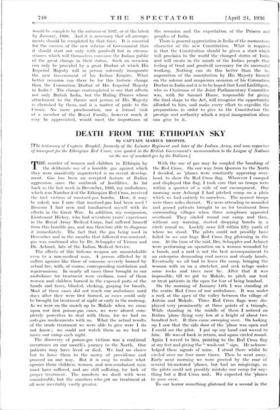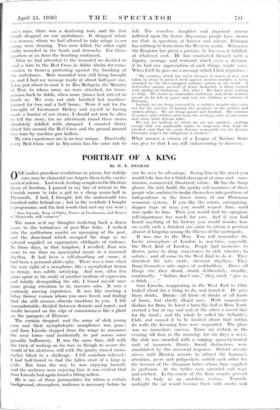DEATH FROM THE ETHIOPIAN SKY
By CAPTAIN MARIUS BROPHIL
iThe testimony of Captain Brophil, formerly of the Leinster Regiment and later of the Indian Army, and now organiser of transport for the Ethiopian Red Cross, was quoted in the British Government's memorandum to the League of Nations on the use of mustard-gas by the Italians.] THE murder of women and children in Ethiopia by the deliberate use of a horrible gas against which they were manifestly unprotected is no recent develop- ment. Gas has been an accepted feature of Italian aggression since the outbreak of hostilities. As far back as the last week in December, 1935; my ambulance, which was Number 3 of the Ethiopian Red Cross, received the first victims of mustard-gas bombs. How, it may be asked, was I sure that mustard-gas had been used ? Because I had seen and familiarised myself with its effects in the Great War. In addition, my companion, Lieutenant Hickey, who had seventeen years' experience in the Royal Army Medical Corps, had suffered himself from this horrible gas, and was therefore able to diagnose it immediately. The fact that the gas being used in December and in the months that followed was mustard- gas was confirmed also by Dr. Schuppler of Vienna and Dr. Achmet, late of the Indian Medical Service.
The effects of this hideous weapon are unmistakable even to a non-medical man. A person afflicted by it suffers agonies like those of someone severely burned by actual fire, with, of course, corresponding mutilation and repercussions. In nearly all cases those brought to our ambulance for treatment were civilians, most of them women and children burned in the exposed parts of the hands and faces, blinded, choking, gasping for breath. Most of these cases did not reach our ambulance until days after they were first burned, as eases could only be brought for treatment at night or early in the morning. As we were on the march up to Makale when we came upon our first poison-gas cases, we were almost com- pletely powerless to deal with them, for we had no anti-gas medicaments with us. What the actual results of the crude treatment we were able to give were I do not know ; we could not watch them as we had to move our camp each night.
The discovery of poison-gas victims was a continual occurrence on our month's journey to the North. Our patients may have lived or died. We had no choice but to leave them to the mercy of providence and proceed on our way. But it is easy to realise what agonies those children, women, and non-combatant men must have suffered, and are still suffering, for lack of proper treatment. The numbers we dealt with were considerable, but the numbers who got no treatment at all were inevitably vastly greater. With the use of gas may be coupled the bombing of the Red Cross. On our way from Quoram to the North I decided, as 'planes were constantly appearing over- head, to show the Red Cross flag. Wherever I camped and displayed this flag, I took care that no troops were within a quarter of a mile of our encampment. One morning near Ashangi I had pitched camp on a plain which we had entirely to ourselves. The nearest troops were- three miles distant. We were attending to wounded and gassed patients brought to us for treatment from surrounding villages when three aeroplanes appeared overhead. They circled round our camp and then, without any warning, started dropping bombs in a circle round us.. Luckily none fell within fifty yards of where we stood. The pilots could not possibly have failed to sec our huge Red Cross flag glistening in the sun. At the time of the raid, Drs. Schuppler and Aehmet were performing an operation on a woman wounded by a bomb, and a raid is not the best accompaniment to an enterprise demanding cool nerves and steady hands. Eventually we all had to leave the camp, bringing the woman with us on a stretcher, and seek refuge under some rocks and trees near by. After that it was impossible, till we got to Makale, to pitch our tent or treat patients in the open for fear of being bombed. • On the morning of January 14th I was standing at the centre Red Cross of our ambulance. It was under a rock at the apex of -the valley between the village of Antoia and Makale. Three Red Cross flags were dis- played very. prominently at three points of a triangle. While standing in the middle• of them I noticed an Italian 'plane flying very low at a height of about two hundred feet. It then came swooping over. On looking up I saw that the side door of the 'plane was open and I could see the pilot. I put up, my hand and waved to him. He waved back in return, and again circled round. Again I waved to him, pointing to the Red Cross flag at my feet and giving the" wash-out" sign. He acknow- ledged -these signals of mine. I stood there whilst he circled over me four More times. Then he went away.. Early, next morning we were greeted by: the roar -of several tri-motored 'planes, but had no misgivings, as the pilots could not possibly mistake our camp for any- thing but a Red Cross unit. We expected the 'planes to pass over To our horror something glistened for a second in the still's rays, there was a deafening roar, and the first bomb dropped on our ambulance. It dropped where ten women, whom we had allowed to take refuge in our camp, were sleeping. Two were killed, the other eight badly wounded in the heads and stomachs.. For three- quarters of an hour the bombing continued. After we had attended to the wounded we decided to send a wire to the Red Cross in Addis Ababa for trans- mission to Geneva protesting against the bombing of the ambulance. More wounded were still being brought in, and I had my message ready at about half-past one. I was just about to send it to Ras Mulageta, the Minister of War, to whose army we were attached, for trans- mission back to Addis, when more 'planes had arrived to bomb us. We were not only bombed but machine- gunned for two and a half hours. Were it not for the foresight of Lieutenant Hickey and myself in having made a barrier of our stores, I should not now be alive to tell the story, for we afterwards found these stores absolutely riddled with shrapnel. I counted thirty direct hits around the Red Cross and the ground around was torn by machine-gun bullets.
My own experiences are in no way unique. Practically every Red Cross unit in Abyssinia has the same tale to tell. The senseless slaughter and impotent misery inflicted upon the heroic Abyssinian people have shown me that, in questions of honour and culture. Ethiopia has nothing to learn from the Western world. Whenever the Emperor has given a promise, he has seen it fulfilled, at whatever cost. He has conducted himself with a dignity, courage, and restraint which even a dictator, if he had any appreciation of such things, might envy. When I left he gave me a message which I here reproduce :
"My country, which has never thought in terms of war, and taken no steps to protect itself against modern warfare, is being attacked by the best-equipped military nation in the world. A defenceless nation, accused of being backward, is being treated with mediaeval barbarism. For what ? We have done nothing to Italy. We foster no imperialist ambitions, and desire nothing except to be left in peace and rear our children as citizens of Ethiopia.
Instead, we are being tortured by Ft ruthless invader who cares not for the sanetity of human life, property or the written and spoken pledge. We are being gassed and bombed. The screams of women and children arise from the smoking ruins of our towns and cities, while Europe talks.
We ask for nothing to which we are not. entitled ; nothing except that our inalienable rights be respected, that Italy be checked, and that the great Nations responsible for the League Covenant respect. the obligations it involves."
What answer a citizen of a League of Nations State can give to that I am still endeavouring to discover.



















































 Previous page
Previous page